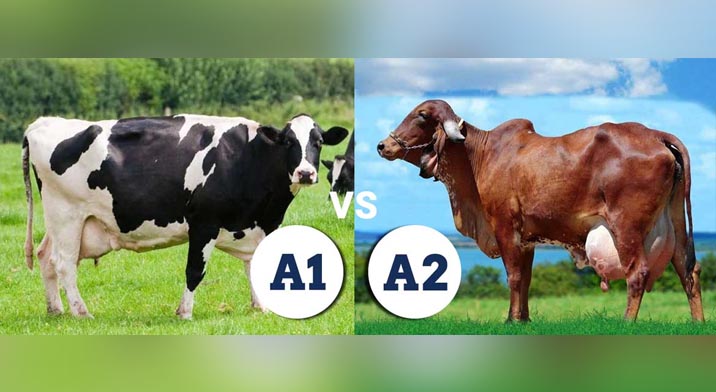For millennia, Hindus have maintained a holy relationship with Cows (Bos Indicus). The Desi breed of cows was given utmost importance among the animals, given its multi-dimensional usefulness. A few years ago, a scientist in New Zealand started making a distinction between two types of milk- A1 and A2. His primary argument was that while A1 milk is harmful to health and causes many diseases, A2 milk has better nutrients and therefore it is beneficial to human health.
In 2018, A1 and A2 became one of Googled keyword in New Zealand and Australia. India came at a distant third in terms of interest in types of milk. According to Corran McLachlan, a New Zealand-based scientist and entrepreneur, who founded A2 Corporation, ‘prominence of A1 beta-casein over A2 could be a public health issue, leading to type 1 diabetes, autism, an increased risk of heart disease, and digestive issues.’
“Demand has been particularly strong in Australia, but also through the cross border e-commerce (CBEC) channel into China,” said A2 Milk Corporation.
Dr N Murali, Head, Department of Animal Genetics and Breeding at the Veterinary College and Research Institute in Namakkal stated that breeds of Indian desi cows- Tharparkar, Gir, and Sahiwal, have a high yield of A2 type milk.
“All indigenous breeds, or Bos Indicus, have a higher frequency of A2 protein,” said Dr Murali. The cross-breeding of Indian cows with foreign breeds like Jersey and Holstein Friesian (which produce more milk, but rich in A2 protein) is muddling the gene pool of Indian cows and destroying their ‘racial purity’.
It is important to note that Indian cows’ as well as Indian buffalos’ milk is rich in A2 protein although Cow’s milk is interchangeably used for A2 milk in popular media.
The Indian government agreed to take initiatives to differentiate between A1 and A2 variety. The Food Safety and Standards Authority of India (FSSAI) is yet to certify different varieties and as of now, Tamil Nadu Veterinary and Animal Sciences University is the only agency which certifies animal on milk variety differentiation. Most of the Indian cows and buffalos produce A2 type of milk the government and the Indian government should have taken advantages of this by exporting A2 certified packaged milk.
The A2 certified milk is being sold at two to three times more price in India, and it is priced many times more than normal milk in foreign countries.
In many western countries, the sale of A2 milk is growing at double-digit. In Britain and Ireland, the sale of A2 milk has reached 10 crore rupees per year and in Australia and New Zealand, which are among topmost dairy exporters, A2 milk is the new buzzword. Even in countries like China, Australian companies are selling easier to digest milk for children, and the sales are growing at double-digit.
Some Indian A2 milk brands are Amul Deshi, Desigo, Haritas, GoShrushti etc, but, the sale of these brands is limited and no steps have been taken to export such a priced commodity in which India could establish a monopoly.
Yes, only Bos Indicus breed of cows cannot be killed. Power to intelligently discriminate is the power gifted by God to humans
— Subramanian Swamy (@Swamy39) October 4, 2018
: Medicinal quality of milk, curative quality of urine-now patented land, fuel&construction potential of dung
— Subramanian Swamy (@Swamy39) May 10, 2018
Subramanian Swamy, BJP’s Rajya Sabha MP, has argued that India should protect Bos Indicus breed. “Yes, only Bos Indicus breed of cows cannot be killed. Power to intelligently discriminate is the power gifted by God to humans,” said Swamy. He argued that Bos Indicus has “Medicinal quality of milk, curative quality of urine-now patented land, fuel&construction potential of dung.” The foreign breeds like Jersey do not possess these qualities.
According to Shakti Lumba, owner of Laksh Farms in Mangar Village in Haryana, Indian cows are dying breed in the country. “The sad reality of the white revolution was that it led to cross-breeding with European cows and import of foreign hybrid breeds for higher yield in order to meet the goal of mass production. This has brought us to a situation today where the desi cow has become a dying breed in India. Imagine this – the Gir cow, which is a Gujarati breed, is now being imported from Brazil and the Brahmi Bull, which is another pure breed, is more popular in Australia. It’s ironic that people in these countries are drinking better quality milk from cows native to our country” said Lumba.
The breed of Indian cows needs to be protected, their milk must be patented, and the Food Safety and Standards Authority of India need to differentiate and certify A2 milk. This way, civilizational heritage can be conserved and could be exploited for commercial benefits.
